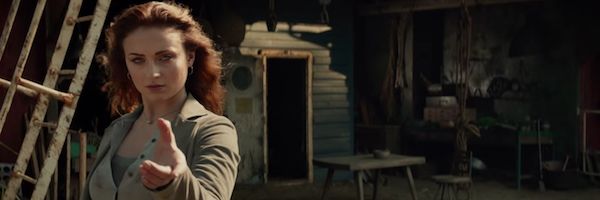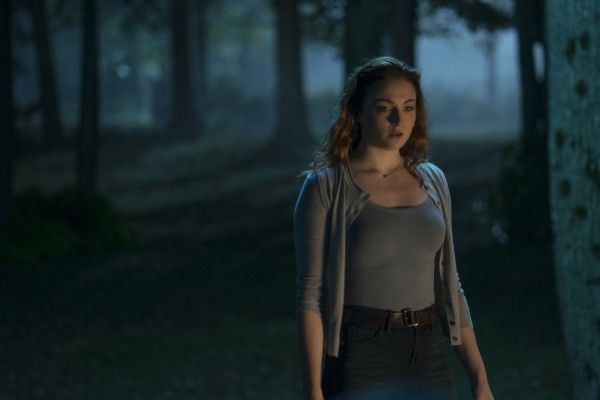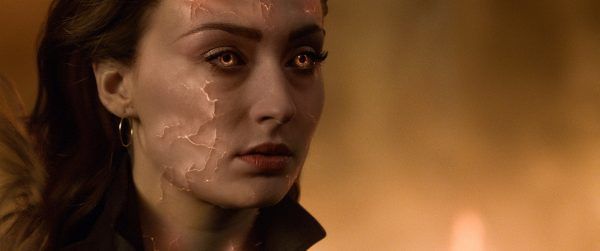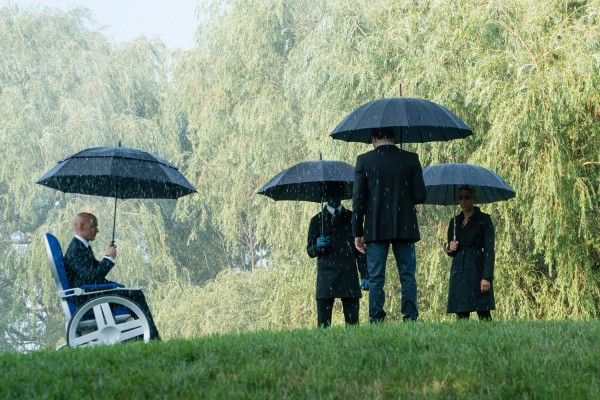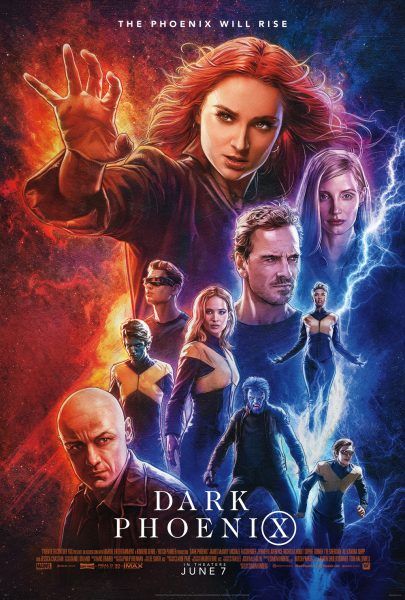Dark Phoenix is the second attempt to bring the famous “Dark Phoenix Saga” storyline to the big screen, and both times, writer Simon Kinberg, who now directs this latest adaptation in addition to serving as screenwriter, seems to be at a loss with how to do the story justice. In X-Men: The Last Stand, a major problem was trying to do both Dark Phoenix and an adaptation of the Astonishing X-Men storyline “The Cure”, and neither one really gets the attention it deserves. This time around, the main problem is that we simply don’t know the main character, Jean Grey (Sophie Turner), well enough to have this be a compelling story. In the comics, having Jean go dark meant something because she had been around since the beginning of the X-Men and that turn had a serious effect on her fellow mutants. Here, that connection doesn’t really exist and the result is a horrendously muddled picture that doesn’t know what it wants to be about as it clumsily tries to weave in set pieces and a battle among X-Men.
The film begins with a prologue showing that a young Jean Grey, whose mutant powers of telepathy and telekinesis were emerging, accidentally killed her parents in a car crash. However, she was taken in by the kindly Professor Charles Xavier (James McAvoy), who assured her that they could fix what was broken and she was not broken. Cut forward to 1992, and the X-Men are now doing space missions where they must rescue a group of astronauts. During the rescue mission, Jean is hit with a cosmic force, but manages to survive and become more powerful as a result. However, this cosmic force carries with it a dark side, and as Jean’s childhood trauma starts to reemerge, she starts hurting people, including her fellow X-Men. This ends up fracturing the mutants who think Jean needs to be put down and those that want to save their friend. Meanwhile, aliens led by Vuk (Jessica Chastain) want to use Jean for her new power.
My fear going into Dark Phoenix was that the audience doesn’t have an emotional investment in Jean or her relationships. The Jean Grey we know has been in one movie—X-Men: Apocalypse—and she was a supporting character. What Dark Phoenix proves is that adapting the Dark Phoenix saga can’t simply be a one-off. It requires building Jean Grey up into an endearing character so that when she goes dark, the audience feels the tragedy of that downfall. It also requires understanding her relationships so that when those are fractured, we share in that loss. None of that happens in Dark Phoenix. When Jean ends up killing a close friend, that loss doesn’t mean anything because those characters never interacted until this movie. When Beast (Nicholas Hoult) goes out for revenge because of that killing, it doesn’t matter because he and Jean don’t have a relationship beyond being fellow X-Men. There’s no definition to the relationship, so nothing really changes in a substantial way.
The Dark Phoenix story could still be an interesting plotline with some stronger subtext, but the film also fails here. At times it seems like the “Phoenix”—the cosmic force inhabiting Jean—is a metaphor for drug abuse. It’s something that has become part of her identity, makes her feel great, but it hurts the people around her and causes them to fracture into those who think she’s beyond help and those that believe she needs their help more than ever. Unfortunately, that metaphor never really develops because you have to deal with the dumb alien subplot and Kinberg seeing the Phoenix more as buried trauma, which also doesn’t really work.
If the Phoenix is a metaphor for Jean’s childhood trauma, you run into a whole host of other messy problems because it’s not just Jean’s story by also Xavier’s. Xavier put barriers into Jean’s mind to protect her from her trauma and when the Phoenix comes along, it destroys those barriers, causing her trauma to reemerge. Again, if this had been built up over multiple movies and showing us how Xavier, in his misguided arrogance and love for Jean tried to protect her from her emotions rather than teaching her how to deal with them, that would be a good story about parents and children. But that backstory doesn’t exist outside of a 10-minute prologue where it seems like more effort is put into showing how Jean’s mom died horribly in the car crash. And if dealing with emotions is the core of the story, that leads into some really ugly territory.
While the aliens are trying to use Jean for her power, you ultimately have a powerful (in that she is physically strong, not that she’s well written) female character, Vuk, telling Jean to embrace her anger and use it to empower herself. On the opposite side, you have Xavier trying to calm Jean down and ultimately needing to apologize for his arrogance, so all that’s needed to quell a woman’s anger is an apology from a father figure. That’s…gross and sad. I don’t think Kinberg set out to make an anti-feminist movie, but that’s how it plays when so much of the plot hinges on Jean rejecting her anger and learning that emotions are good as long as she uses them to help others. In a better structured series, this could be a neat inversion of Magneto’s (Michael Fassbender) story where he constantly gives into his anger and ends up hurting people. But because Magneto never seems to suffer any consequences for his mass murders, learning to cope with emotions comes off as a hollow resolution. For a character like Magneto, his anger is something cool and powerful (and Fassbender continues to be a highlight of these movies), but for Jean, anger is dangerous and destructive.
All of this failed subtext becomes a greater drag because the surrounding movie is such a slog. The story leans hard into drama, but there are choices here that feel straight out of the 1990s X-Men cartoon. When the President calls the X-Men for help, he has a special “X” phone. The new X-Jet has a special periscope specially made for Cyclops’ optic blasts (Cyclops sold separately). One of Magneto’s henchmen’s special power is really powerful hair braids that he uses as whips. The movie takes place in the 90s, but the X-Men’s HQ is filled with flat-panel screens. 30 years have passed since X-Men: First Class but everyone looks pretty much the same. Magneto is a Holocaust survivor who appears to be in his early 40s. How are we supposed to take this story seriously when so little care has been put into the world in which it takes place?
I’ll always be an X-Men fan since the 90s cartoon was my gateway to geekery, but Dark Phoenix shows that this franchise has made too many miscalculations to continue as it is. Even setting aside the messy continuity, why did these movies need to jump forward a decade with every installment? Why adapt “The Dark Phoenix Saga” if the character relationships haven’t been properly established? What makes an X-Men movie unique when the world now has The Avengers? These questions were never really answered, and so the current X-Men series closes not with triumph but with a shrug (I'm inclined to believe that the upcoming New Mutants, which doesn't share any cast members with the X-Men saga proper, will get buried on Hulu or Disney+). When Marvel Studios inevitably reboots X-Men, a movie like Dark Phoenix will be a forgotten relic. The characters and their world deserve better, but we’ll have to wait until their next evolution.
Rating: D

